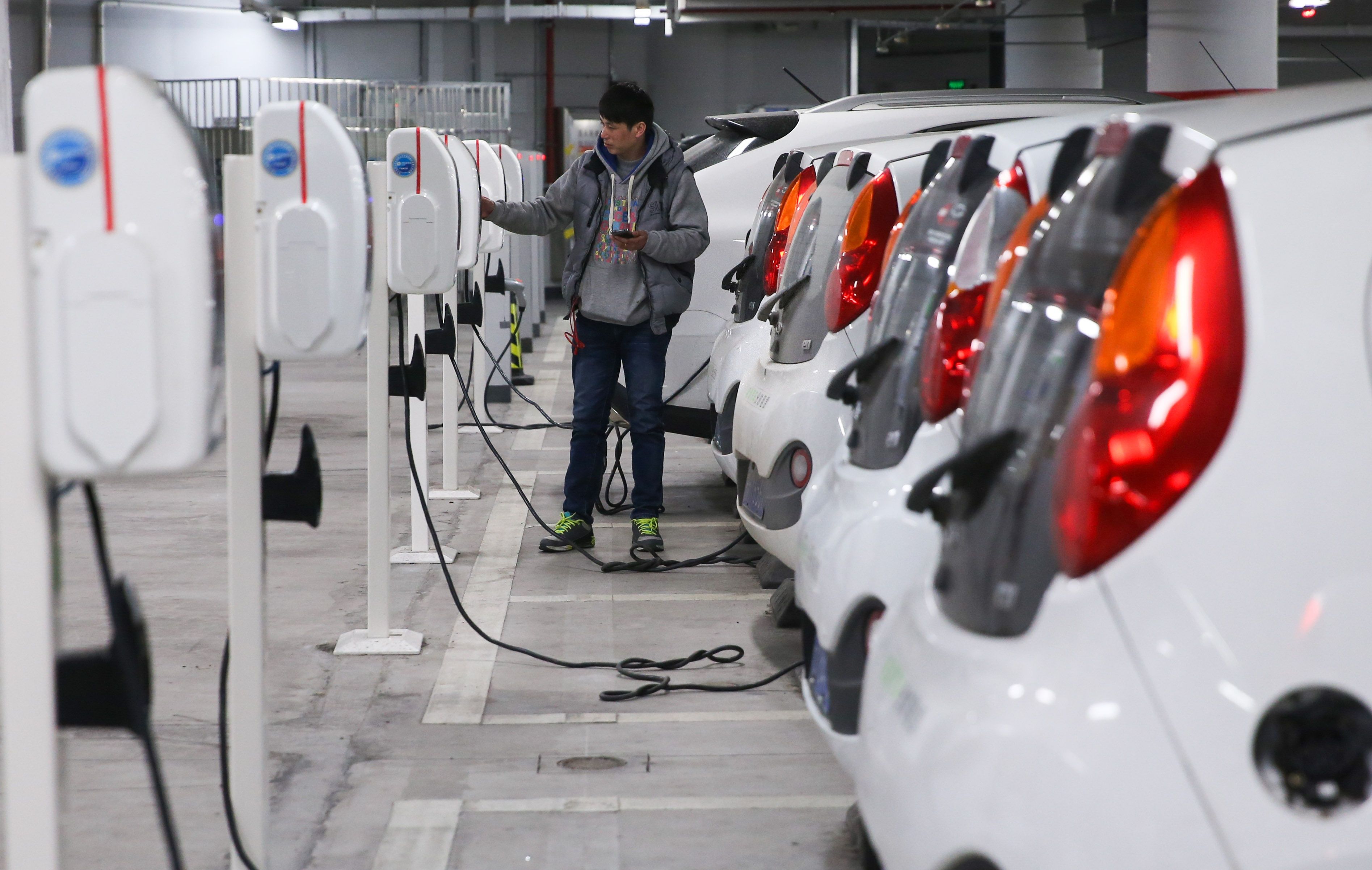Auto Dealers Push Back On Mandatory Electric Vehicle Sales

Table of Contents
Financial Concerns and Infrastructure Challenges
One of the most significant concerns among auto dealers regarding mandatory electric vehicle sales centers on the substantial financial hurdles involved. The transition to EVs requires significant upfront investment. Dealerships must invest in new infrastructure, including the installation of costly charging stations capable of supporting various EV models and charging speeds. This is a major capital expenditure, particularly for smaller dealerships with limited resources.
Furthermore, the profit margins on electric vehicles are often lower than those on gasoline-powered cars. This is due to several factors, including the higher manufacturing costs of EVs and the intense competition in the emerging EV market. This lower profitability, coupled with the substantial infrastructure investment, creates a challenging financial landscape for dealerships already operating on tight margins.
The lack of robust charging infrastructure in many regions further exacerbates the problem. Consumers are hesitant to adopt EVs if they cannot readily charge them, and this lack of widespread charging networks directly impacts consumer demand and dealer preparedness. This creates a vicious cycle, hindering the very transition that mandatory sales policies aim to accelerate.
- Higher initial investment in EV inventory.
- Lower profit margins per vehicle compared to internal combustion engine (ICE) vehicles.
- Need for significant investment in fast and reliable charging station infrastructure.
- Uncertainty regarding the long-term viability of government incentives and continued consumer demand for EVs.
Consumer Demand and Market Readiness
The argument against mandatory electric vehicle sales also hinges on the question of market readiness. While EV technology is rapidly advancing, several factors still limit widespread consumer adoption. Range anxiety—the fear of running out of battery power before reaching a charging station—remains a significant barrier for many potential EV buyers. Similarly, longer charging times compared to refueling gasoline vehicles present a practical inconvenience.
The higher purchase price of EVs compared to comparable gasoline-powered vehicles is another key deterrent, particularly for budget-conscious consumers. This price disparity, combined with the other limitations, means that a substantial portion of the population may not be able to afford or practically utilize an EV, even if mandated. Limited consumer awareness and understanding of EV technology and maintenance also contribute to lower adoption rates.
- Range anxiety remains a major consumer concern.
- Charging infrastructure limitations restrict accessibility and convenience.
- Higher initial cost of EVs compared to gasoline cars creates a barrier to entry for many consumers.
- Limited consumer awareness and understanding of EV technology and its benefits need to be addressed.
Government Regulations and Policy Impacts
The push for mandatory electric vehicle sales stems from specific government regulations and emission targets aimed at reducing greenhouse gas emissions and combating climate change. While the environmental benefits are undeniable, the approach of imposing mandates without careful consideration of the industry's capacity to adapt can have unintended negative consequences.
Inflexible government mandates can severely impact the auto industry's ability to smoothly transition to EV production and sales. Such policies could lead to job losses in the automotive sector, especially in regions heavily reliant on the production of gasoline vehicles. The sudden shift could overwhelm dealerships and the supply chain, causing disruptions and inefficiencies.
Alternative policy approaches, such as offering substantial tax incentives, subsidies, and investing heavily in charging infrastructure, could foster EV adoption without the potentially harmful effects of mandates. A more gradual, market-driven approach may be more sustainable in the long run.
- Analysis of specific government regulations and emission reduction targets.
- Impact on dealer profitability and established business models within the automotive industry.
- Discussion of alternative incentives for EV adoption, including tax breaks and infrastructure development.
- Potential job losses and economic disruption in the automotive sector due to a rapid, mandated transition.
The Role of Dealers in the EV Transition
Despite the pushback, auto dealers play a critical role in the successful transition to electric vehicles. Dealerships are crucial for educating consumers about the benefits and practical aspects of EV ownership. They provide valuable expertise in sales, maintenance, and after-sales service. Investing in training programs that equip dealers with the necessary knowledge and skills to effectively sell and service EVs is essential.
Collaboration between government agencies and dealerships is key to overcoming challenges. Government support for dealer training initiatives, alongside investment in charging infrastructure, could alleviate some of the financial burden on dealers and foster a more successful transition. This collaborative approach can unlock opportunities for dealers to offer innovative EV services, such as specialized maintenance packages or subscription-based charging plans.
- Dealer expertise in consumer education and sales is essential for driving EV adoption.
- Importance of comprehensive dealer training programs for EV maintenance and sales.
- Collaboration between government and dealers is crucial to smooth the transition and address challenges.
- Opportunities for dealers to offer innovative EV services and create new revenue streams.
Conclusion: Finding a Balance in the Push for Mandatory Electric Vehicle Sales
The arguments against mandatory electric vehicle sales highlight significant financial, infrastructural, and consumer-related challenges. While the goal of a sustainable transportation future is crucial, a balanced approach is necessary. Focusing on incentives, improving charging infrastructure, and fostering collaboration between the government, auto dealers, and manufacturers will create a more effective path towards widespread EV adoption. Rushing the transition through mandates risks harming the very industry essential to achieving this goal. Finding a balance between environmental sustainability and economic viability requires a thoughtful approach to the issue of mandatory electric vehicle sales. Let's explore collaborative solutions that foster responsible EV adoption.

Featured Posts
-
 High Stock Market Valuations A Bof A Analysts Take On Investor Concerns
May 23, 2025
High Stock Market Valuations A Bof A Analysts Take On Investor Concerns
May 23, 2025 -
 Today Show Host Calls Out Al Roker Over Disclosed Private Conversation
May 23, 2025
Today Show Host Calls Out Al Roker Over Disclosed Private Conversation
May 23, 2025 -
 Global Forest Destruction A Record Year Fueled By Wildfires
May 23, 2025
Global Forest Destruction A Record Year Fueled By Wildfires
May 23, 2025 -
 The Who The Untold Story Behind Their Iconic Name
May 23, 2025
The Who The Untold Story Behind Their Iconic Name
May 23, 2025 -
 Zak Starkey Rehired The Whos Drummer Confirmed By Pete Townshend
May 23, 2025
Zak Starkey Rehired The Whos Drummer Confirmed By Pete Townshend
May 23, 2025
Latest Posts
-
 Nightcliff Robbery Teenager Arrested Following Fatal Stabbing Of Shop Owner In Darwin
May 24, 2025
Nightcliff Robbery Teenager Arrested Following Fatal Stabbing Of Shop Owner In Darwin
May 24, 2025 -
 Darwin Teen Arrested Shop Owner Stabbed During Nightcliff Robbery
May 24, 2025
Darwin Teen Arrested Shop Owner Stabbed During Nightcliff Robbery
May 24, 2025 -
 Natures Sanctuary A Seattle Womans Pandemic Story
May 24, 2025
Natures Sanctuary A Seattle Womans Pandemic Story
May 24, 2025 -
 10 Let Pobediteley Evrovideniya Karera I Zhizn Posle Triumfa
May 24, 2025
10 Let Pobediteley Evrovideniya Karera I Zhizn Posle Triumfa
May 24, 2025 -
 Early Pandemic Life How A Seattle Green Space Became A Womans Safe Haven
May 24, 2025
Early Pandemic Life How A Seattle Green Space Became A Womans Safe Haven
May 24, 2025
